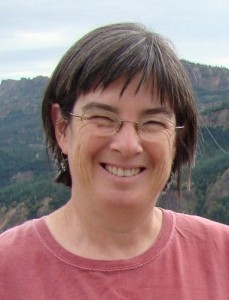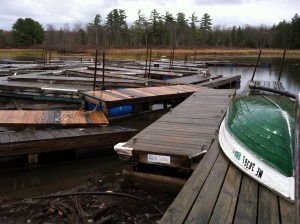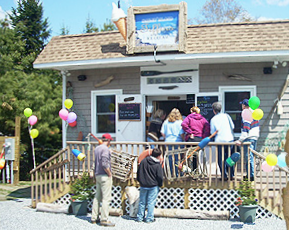Lea Wait's Blog, page 318
June 23, 2014
2014 at the Halfway Point
John Clark: We’re close to the midpoint of 2014 and thus far, I’ve read 122 books. Despite ramping up my reading from last year, my TBR pile has grown at an almost 2 to 1 ratio (two added for every one read) I have reached a couple of interesting conclusions. First, I’m beginning to hate series, particularly ones that are extremely good, because I am impatient and want that next book NOW, not next year. Second, there are so many amazingly intriguing young adult books being published these days, that I’ll never be able to read all those that interest me, no matter how long I live. I guess that’s far better than living in a world where the reading choices are very limited, but the decision as to which ones to pass up isn’t easy by any means. I may end up seeking out a self help group called Overreaders Anonymous.
Last week, James Hayman, Vicki Doudera and I did a program at the South Portland Public Library. I focused on some of the better YA books I’ve read in 2014, because that part of my professional life has been very active thus far in 2014. Below are some of the better reads from that list. I can assure you that sometime in September, I’ll have another list to share that’s equally as enticing. While not all are mysteries, there are several that fit the description very nicely and overall, the titles mentioned below cover most of the genres popular with teens today.
Far From You by Tess Sharpe, Hyperion, 2014. ISBN: 9781423184621. This is an amazing first book. It combines mystery, a girl’s struggle with addiction and a love story seamlessly as well as doing a very good job of making it next to impossible to figure out who the killer is. Sure there are sexual references and some strong language, but if you’re a librarian, do not let them prevent you from adding this book to your collection. This is a sweet, but sad love story blended with a dandy mystery. It will appeal to lesbian and bisexual teens in particular, but should have a much wider audience and serious consideration for a young adult Edgar nomination.

Thin Space by Jody Casella, Simon Pulse, 2013. ISBN: 9781582704357. What would you do if you felt responsible for the death of a twin and couldn’t let go of the guilt, especially if a dying woman told you there was a ‘thin space’ between worlds where if you were lucky enough to find it, you could cross over and speak to your dead loved ones. This is the dilemma Marsh faces while stumbling, zombie-like through life. When he meets Maddie, a newcomer to town, she agrees to help him find the thin space supposedly somewhere in her house. Part ghost story, part mystery with a little romance added in, there’s a really good gotcha at the end. I hope it gets an Edgar nomination next year.

And We Stay by Jenny Hubbard, Delacorte Press, 2014. ISBN: 9780385740579. A very sad girl, a dead boy, secrets slowly revealed via poetry. Older teens who have wrestled with grief, loss and guilt may find this book helps them to come to grips with unresolved feelings. Those who love poetry and a story with bits of mystery will also like this one.

The Summer I Found You by Jolene Perry, Albert Whitman, 2014. ISBN: 9780807583692. Kate can’t accept her diabetes and when her boyfriend dumps her, she deals with it in subtle, but self-destructive ways., so much so that her behavior threatens her chance to room with her best friend, Jen at college in the fall. Aiden, Jen’s cousin, is dealing with his own wounds suffered while on duty in Iraq. He just wants to hide from life. When Jen twists Kate’s arm to come along on a pretend date with Aiden, her lack of a filter when she speaks, could have sabotaged things, but instead Aiden’s intrigued by her honesty and a quirky love story about two wounded teens begins. Jolene Perry and her co-author on numerous books Nyrae Dawn, write some of the best YA romance fiction available today.

Inhuman by Kat Falls, Scholastic Press, 2013. ISBN: 9780545370998. First book in a new dystopian series with mystery, monsters and violence mixed very nicely. Imagine that a major amusement park chain wanted to introduce new mutant creatures to spice up the experience, but the DNA went rogue, causing people to become part animal and all zombie. Now divide the U.S. With a 700 foot high wall stretching from the gulf to Canada, with everyone west of it scared to death that the mutant creatures will breach it and infect those who are still clean. This is what Lane McEvoy faces when she’s set up to have everyone believe she’s infected. Her blackmailers force her into the dangerous world east of the wall to find her father who is suspected of hunting for illegal artifacts. It had me turning pages well into the night and I can’t wait for the second in the series.

Slated, Fractured and Shattered by Teri Terry, (various publishers/editions), 2012-2014. Perfect trilogy for anyone experiencing Hunger Games angst. “ These are a tightly written trio of books that tell the story of Kyla, a girl in a future time who was slated, a process that wiped the mind completely clean of thought. It was developed by the British government after severe riots by young people years ago. It’s a supposedly more humane punishment, although some depressed teens and those lacking families request the treatment because those who are slated get happy new memories and another family. Kyla was supposedly a terrorist, but she starts having flashbacks to another life, something that should be impossible after being slated. She’s given a family with a sister who was also slated, and parents with powerful connections to the government, In fact, her new mother is the daughter of the prime minister who was killed by a terrorist bomb. She lost her own son in a similar terrorist attack.” Tightly written with evil, plot twists, a bit of romance, all set in a scary futuristic Great Britain.

Since You’ve Been Gone by Morgan Mattson, Simon & Schuster, 2014. ISBN: 9781442435001. Emily was a herd animal before the day she was running and Sloane stopped her because she was locked out of her house. For the next two years, they were joined at the hip with daring Sloan leading quiet Emily into adventures and helping her to experience life as she’s wanted to. When Em returns from a family trip, Sloan has vanished and now Em’s parents are wrapped up in writing a new play, completely ignoring her. Feeling completely lost, She grabs at the letter she gets in the mail like it’s a rope and she’s drowning. Instead of an answer as to why Sloan vanished, it’s a list of thirteen tasks: Kiss a stranger, go skinny dipping, steal something, break something, Penelope, ride a dern horse, ya cowpoke, 55 S. Ave, ask for Mona, the backless dress and somewhere to wear it, dance until dawn, share some secrets in the dark, hug a Jamie, apple picking at night, sleep under the stars. Em is scared to death of doing them on her own, but what other way does she have of getting her best friend back? Along the way, she finds herself, discovers someone who cares about her and solves the mystery of Sloan’s sudden disappearance.

Dreamer Wisher Liar by Charise Mericle Harper. Balzer and Bray, 2014. ISBN: 9780062026750. What do you do when your best friend is moving away and you’ve depended on her in ways that ordinary teens can’t understand? This is what Ashley’s facing. She has she has Prosopagnosia, a condition that makes her “face blind,” (she is unable to recognize people she knows when she sees them). And Lucy has always helped her when it hits. Ashley was looking forward to several weeks at camp before Lucy leaves, but her parents have agreed to take in a stranger seven year old, Claire, whose mother has died to give her father time to grieve. Ashley’s unclear on the connection between Claire’s late mother and hers, but when she discovers a mysterious jar in the cellar full of wishes written on crumpled bits of paper, something magical happens. When she sits in a particular chair and reads one, she is transported back in time where she can watch two girls about her age as they become friends and then have some difficult times. As she experiences more and more of these, they change how she sees Claire’s intrusion in her life. This is a neat blend of mystery, a little magic and some coming of age that will leave the reader with a feel-good experience.

The Secrets of Tree Taylor by Dandi Daley Mackall, Knopf, 2014. ISBN: 9780375868979. Tree Taylor is sitting on the front step one Sunday morning in her PJ’s, trying to come up with something to write about, when she hears a gunshot down the street. Her dad, the town doctor, hustles past her and tells her to stay put as he heads to where the shot was fired. Tree follows and from her hiding place, watches as their reclusive neighbor. Mrs. Kinney comes out of the house carrying a rifle. Her dad’s behavior is curious. He turns away from Mrs. Kinney and sits on the step. When she lowers the rifle, he takes it. He tells the sheriff that the shooting of Mr. Kinney in the shoulder, was accidentally self-inflicted. So begins a neat juvenile mystery that has some coming of age elements, a nice look at how people with concerns about the Vietnam War, early on had to navigate a tricky sea and how a young and smart teen girl learns that parents aren’t perfect, but are important.

The Chance You Won’t Return by Annie Cardi, Candlewick Press, 2014. ISBN: 9780763662929. Figuring out normal teen stuff is complicated enough for most kids, but what do you do when there’s a boatload of stuff the guidebooks never mention overwhelming you? That’s what Alex Winchester is facing. Her dad works for the post office. Her mom works at a dentist’s office, but does she any more? It wasn’t that long ago when Alex’s baby sister was born too prematurely to breathe on her own. She died shortly after birth, setting in motion events that leave Alex way over her head. If it wasn’t bad enough that she has to worry about her mother sliding into a delusional world where she thinks she’s Amelia Earhart, Alex has her own phobia about driving. She freaks every time it’s her turn to get behind the wheel for driver’s ed. When she steals pages from Amelia’s biography in the high school library, she becomes even more freaked out, especially when she realizes what Amelia’s ultimate fate was. This is a sad book that ends on a hopeful note. It’s one geared for mature teens, particularly those who are wrestling with grief or family mental health issues. It’s a worthy addition for both school and public libraries.

Pushing The Limits, Dare You To, Take Me On, Crash Into You by Katie McGarry (Harlequin Teen). These four books do edgy teen romance better than anyone. Katie takes a different supporting character from the previous book and makes them the main one in the next, something I’ve not seen done before. The life conflict issues and the suspense in them are perfectly done. We can’t keep them on the shelves.
June 20, 2014
Weekend Update: June 21-22, 2014
 Next week at Maine Crime Writers there will be posts by Susan Vaughan (Monday), John Clark (Tuesday), Sarah Graves (Wednesday), Kate Flora (Thursday), and Kaitlyn Dunnett (Friday).
Next week at Maine Crime Writers there will be posts by Susan Vaughan (Monday), John Clark (Tuesday), Sarah Graves (Wednesday), Kate Flora (Thursday), and Kaitlyn Dunnett (Friday).
In the news department, here’s what’s happening with some of us who blog regularly at Maine Crime Writers:
Lea Wait: Saturday, June 21, I’m honored to have been invited to be one of the speakers at the unveiling/opening of Wiscasset’s Museum in the Streets. Wiscasset is the small Maine seaport where five are my books (Uncertain Glory, Stopping to Home, Seaward Born, Wintering Well, and Finest Kind) are set, and I’ll be briefly talking about it’s history, and why I chose that town to write about. The ceremony will be from 11:30-12:00 near the town pier, and then the crowd will reconvene at 12:15 to unveil the first placard at the old Custom House, across Water Street, and a reception to follow will be on the pier. The Museum in the Streets will include two self-directed walking tours of the village, with directions, and signs in front of particularly historic or interesting locations. Buy a lobster roll at Red’s Eats and stroll one of the most scenic villages in Maine. You might even look for locations mentioned in my books …..!
Then, a little early notice: Saturday June 28 I’ll be discussing my Shadows on a Down East Summer at the Mainely Murder Bookstore on Bourne Street in Kennebunk, from 3:30-5:00.
An invitation to readers of this blog: Do you have news relating to Maine, Crime, or Writing? We’d love to hear from you. Just comment below to share.
And a reminder: If your library, school, or organization is looking for a speaker, we are often availble to talk about the writing process, research, where we get our ideas, and other mysteries of the business. Contact Kate Flora: kateflora@gmail.com
June 19, 2014
Gone Lobstering
Hi all. Barb here.
I’ve written in the past about how I went to the Cabbage Island Clambake to research Clammed Up, and how I traveled to the Machias Blueberry Festival to research Boiled Over. The third book in my Maine Clambake Mystery series, Musseled Out takes place in the world of lobstering. So you guessed it, we’re going out on a lobster boat.
As always, my timing was off. Musseled Out was due June 1, and while some Maine lobstermen work year-round, and many start their season in April, no one was taking tourists out until well into May. I went out with Captain Clive Farrin in Boothbay Harbor, and I totally recommend the tour.
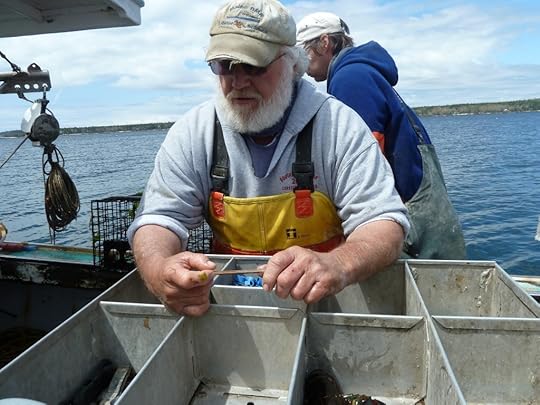
Captain Clive Farrin explains how to measure the lobster. In Maine legal lobsters must be between 3 1/4 and 5 inches long on the carapace (from the eye socket to the start of the tail). Larger and smaller lobsters must be thrown back.
Of course, I’d done a lot of reading (and completed a first draft) before I went out, but there’s nothing like the experience. I would have gotten most things right, but several small, but important things wrong.
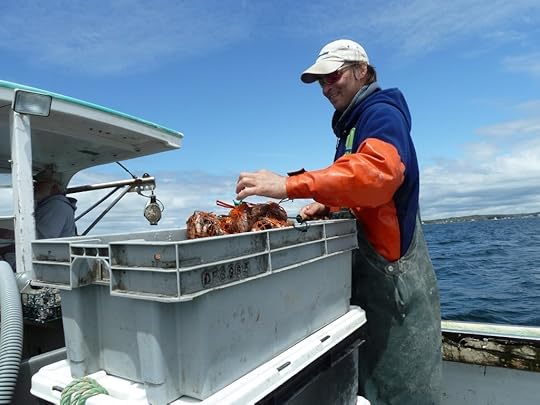
Sternman Cage prepares a bag of bait to put in a lobster trap.

Hauling a trap.

A lobster in the tray waiting to be measured and banded.

A female lobster bearing eggs. She’ll have a V notch put in her tail and be thrown back. The V means she can’t be taken even when she is not bearing eggs.

The string of traps going off the stern, back into the sea
I had a blast doing this bit of research and hope you enjoy Musseled Out.
June 18, 2014
Mystery or thriller? What’s the difference?
James Hayman: These days, like most of the other writers who contribute to this blog, I’m frequently invited by bookstores, book discussion groups and public libraries to discuss the art and the craft of writing crime fiction. In fact, I’ll be joining my fellow Maine Crime Writers, Vicki Doudera and John Clark, for just such a session tomorrow night, June 19th at 6:30 at the South Portland Public Library. The discussion has been been titled “It’s Elementary,” as in “My Dear Watson.”
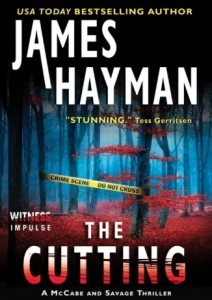 During these sessions, more often than not, someone’s hand will pop up and he or she will say: “When I read The Cutting it was pretty easy to figure out who the bad guy was fairly early on in the book. Shouldn’t you have made the reveal of the villain less obvious?”
During these sessions, more often than not, someone’s hand will pop up and he or she will say: “When I read The Cutting it was pretty easy to figure out who the bad guy was fairly early on in the book. Shouldn’t you have made the reveal of the villain less obvious?”
My answer is no. Why? Because The Cutting isn’t a whodunit or a mystery. It’s a suspense thriller.
So what’s the difference between the two?”
I think a mystery is most accurately defined as “a novel of revelation.” It usually starts with a murder and it’s the sleuth’s job to figure out who the killer is. The identity of the killer and often the details of the crime remain hidden while the sleuth, through clever detective work, untangles the web of clues. At the end there is pretty much always an “Ahah!” moment when all is revealed.
The structure of a thriller is different. Broadly defined a thriller maintains interest by creating suspense aka a sense of impending doom. It forces the audience to sit breathlessly on tenterhooks waiting to find out if something terrible, which they have been clued in on, is going to happen to one or more of the characters before the hero can stop it.
Alfred Hitchcock once famously discussed how one creates suspense in films during an interview with French director Francois Truffaut. Imagine a scene, he said, in which two men are sitting, sipping coffee and talking quietly at a table in an outdoor café. Suddenly, a bomb goes off under the table and both men are killed. While there is surprise in the scene when the bomb explodes, there is no suspense.
Now imagine the same café. This time it is early morning and the tables are empty. A shady looking man rides up on a bicycle. He gets off. Looks around to make sure no one is watching. He then places the bomb under the table and sets it to go off at exactly 1PM. Time passes and we see the two men from the first scene arrive at the café. They sit down at the table with the bomb. They order their coffee. A clock in the background tells us it is ten minutes to one. As the men sip coffee and talk we see the minute hand on the clock inching toward 1PM.
This is as good an example of creating suspense as any I know. And suspense is the single most important element in writing a thriller.
Suspense thrillers are nothing new. Back in the corny old days of silent movies, a heroine…let’s call her Gwendolyn… might be tied to the railroad tracks by a villain. We’ll call him Black Bart. The audience didn’t have to figure out who the bad guy was. They were right there watching Black Bart tie poor Gwendolyn to the tracks, after which he warns her that if she doesn’t forsake her one true love, Harry Handsome, and marry him instead, he will leave her there, waiting to be squashed like a bug by the oncoming locomotive.
At this point the camera usually shifts away to the oncoming locomotive that, presumably, is heading her way.
We then cut to the hero, Harry Handsome, as he learns of the danger Gwendolyn is in. He immediately leaps on his white horse and races off to see if he can get to the tracks in time to rescue Gwendolyn before the train squashes her.
To maintain the suspense, we’d next have four shots, rotating in fast sequence:
First, we see Gwendolyn lying on the tracks and crying out in fear. “Save me! Save me! Hurry, Harry and save me!”
Second, we’d see Black Bart. Bart is most likely hiding behind a big rock and indulging in an occasional evil chuckle (“Heh, heh, heh”). He generally twirls his mustache while chuckling.
Third, we’d see the locomotive speeding ever closer. How fast is it going? Don’t ask.
Fourth, we see Harry Handsome aboard his noble white steed riding hell bent for leather to rescue Gwendolyn.
Can Harry possibly get there in time to save his true love and dispatch the evil Black Bart? Probably not.
That’s because (and this twist is important to the structure of almost any thriller) the viewer knows something Harry doesn’t. They know that the bridge over which Harry must ride to rescue Gwendolyn has been secretly dynamited by one of Bart’s nasty henchmen.
The audience wrings its hands. With the bridge out, is there any way Harry can possibly get across the ravine in time to save the day? Or more importantly to save Gwendolyn?
Of course there is. But the audience can’t imagine what it is until they see Harry figure out how to do it. When he does, he somehow crosses the ravine and gets to the tracks in the nick of time. Gwendolyn is saved by the narrowest of margins. The locomotive passes by harmlessly, though in order to show what a close call it was, perhaps it crushes one of the dainty slippers that happened to fall from her foot when Harry untied her.
Enraged by his failure, Black Bart jumps up and down saying “Curses! Foiled again!” The audience erupts in stunned and delighted applause. Gwendolyn and Harry Handsome kiss, then climb aboard his gallant steed and ride happily off into the sunset.
While in no way as corny, that really is the basic structure I followed in writing The Cutting. Lucinda Cassidy isn’t tied to railroad tracks waiting to be squashed. Instead she’s abducted and locked in a dark room waiting to be killed in a horrible way she can’t even imagine. A horrible way that the reader is well aware of. The heroes, Mike McCabe and his partner Maggie Savage, do manage to find Lucinda in the nick of time, just before the bad guy completes his evil plot by slowly and painfully killing her.
For those who haven’t read the book, I won’t reveal more of how Mike and Maggie do it. That, after all would be a spoiler.
June 16, 2014
Which Comes First? Character? Place? Plot? Time?
Lea Wait, here, thinking about all the questions I’ve ben asked as an author. There are many … but a few have stuck in my mind, for different reasons.
Perhaps the most difficult question I’ve ever been asked was from a very serious woman. She’d just finished writing a book, she explained. But she still hadn’t decided when her story would take place. “How,” she asked me, “How do you decide what period to set your book in?”
That question flummoxed me, as my grandmother would have said, because her question was

Lea Wait at Fort Edgecomb in the fog
backwards. How could she have written a story that would ring true — factually, emotionally, sociologically, or geographically — without knowing when (and where) it took place? How could a writer impose a time (or place) on an existing plot? A good story grows out of a specific place and time. Even in a basic plot (Girl loves boy; girl loses boy. Girl finally finds true love.) the characters would have different feelings; different beliefs; different challenges; different possibilities; in different places and years.
Of course, when all the elements of fiction finally come together they become STORY.
But … as someone else asked me … which comes first for an author? Character(s)? Place? Plot? Time?
Another author might have a different answer, but for me, books are built around a place (often small town Maine,) a time (a specific year in a specific century)… and a defining event that either took place … or could reasonably have taken place … in that time and place. Once I know those elements, then I can go on to creating my characters (how old are they? what relation do they have to the event? to each other? how does the event change their lives? change them? what do they want? what are they afraid of? What are they hiding? What are they avoiding?) The plot is how each characters’ answers to those questions interact with each other, presenting conflict, challenges, highs, lows, growth for the characters … and an endpoint. Basically: action.
Our world changes quickly. For a twentieth century example: the roles of men and women (and their relationships to each other) have changed decisively during the past 50-60 years. A woman who grew up in the 1950s wouldn’t see her world, her potential, her future, in the same way as a woman who grew up in the 60s or 70s … and certainly not in the way a young woman of today would. Women in different decades had different options, Different potentials. And men who grew up next to those women also saw the world differently — differently from the woman, and differently in every decade.
Move those two people back a century – or two – or more — and their worlds are even more different. Not just the physical worlds in which they live and the tasks they must do. What has changed most is their view of the world, and of their place in it. Of course, where those people live (what country? what region? state? city or town or farm?) and their race, and their socio-economic status are also critical elements to defining them.
Today many people take anti-depressants or anti-anxiety pills to help them get through their days. In the 19th century they would have taken opium, or laudanum (a mixture of opium and alcohol.) What alcohol would they have drunk? Gin, for lower glasses in the UK. Beer, for early Europeans in America. Sherry, for wealthy 19th century women who weren’t prohibitionists. Whiskey and/or beer for Irish immigrants. Cocktails, in the 1920s. Class differences; geographic differences; whether you were a man or a woman; all changed the way you accepted or rejected the idea of drinking alcohol.
And so forth.
So, what comes first? For me, a place. A time. A challenge or event or circumstance. Then the characters appear. Characters who have grown up in that time or place, or have for some reason (why?) come to that place. Characters who must cope with the demands of their time. Characters who are in conflict with parts of themselves, or with others.
Only when all of those are in place can plotting begin.
Eating Maine
Here at Maine Crime Writers, we talk a lot about writing, and about snow and fog and critters and living in Maine. We talk about lobsters and guns and addiction and research. We talk about the characters who live in our town and inspire the characters in our books. Today, we’re talking about “Eating Maine,” and the vast range of products made in Maine that we’re particularly fond of. Actually, there are so many special Maine-made products that this post will be one in a series.
Growing up in Union, one of our closest neighbors, and also my high school science and math  teacher, was a woman named Mary Helen Raye Hardie. That’s Raye of the Eastport Rayes. And of Raye’s mustard fame. Ask anyone about Maine products and Raye’s mustard rayesmustard.com will top the list. We even like to include it when we do a giveaway basket. It’s that quintessentially Maine.
teacher, was a woman named Mary Helen Raye Hardie. That’s Raye of the Eastport Rayes. And of Raye’s mustard fame. Ask anyone about Maine products and Raye’s mustard rayesmustard.com will top the list. We even like to include it when we do a giveaway basket. It’s that quintessentially Maine.
 Being crime writers, our list naturally includes two products developed by retired Portland Deputy Police Chief Joe Loughlin: Loughlin’s Irish Marinade and Blueberry Marinade http://loughlinirish.com Intriguing not simply because these marinades are delicious, but because most people don’t imagine police chiefs in the kitchen, whipping up a batch of marinade. But as we writers can tell you, don’t be too quick to judge people. They can surprise you. Even the ones we make up can surprise us.
Being crime writers, our list naturally includes two products developed by retired Portland Deputy Police Chief Joe Loughlin: Loughlin’s Irish Marinade and Blueberry Marinade http://loughlinirish.com Intriguing not simply because these marinades are delicious, but because most people don’t imagine police chiefs in the kitchen, whipping up a batch of marinade. But as we writers can tell you, don’t be too quick to judge people. They can surprise you. Even the ones we make up can surprise us.
The amazing Tess Gerritsen came to dinner once and brought a bottle of Maine-made vodka. Until that moment, I didn’t know it existed. More recently, I was in a restaurant in Ellsworth, and there was an entire menu of Maine-maine drinks. I’m personally partial to blueberry soda.
Send out a quick e-mail to our writers asking, “What are you favorite Maine products?” and the responses come flying quickly back.
Al Lamanda says:
Anjon’s pasta sauce.
Ann Marie’s barbecue sauce from Bangor.
Aunt Sissie’s fudge from Union, Maine.
Bald Mountain maple syrup in Rockland
Borealis breads in Wells.
Cold River vodka in Freeport.
Gifford’s ice cream in Skowhegan.
And clearly, Al is still in the first half of the alphabet!
Lea Wait has Raye’s mustard on her list, along with these:
Stonewall Kitchen http://www.stonewallkitchen.com products in general, and their Roasted Onion and Garlic Jam in particular. Kate’s favorite is the blueberry jam, which tastes truly homemade and is loaded with tiny wild blueberries.
Back River Gin (and my favorite of theirs, Cranberry Gin)
and Waldo Stone Farm’s Bloody Oyster Cocktail, an oyster-and-the-sea flavored Bloody Mary Mix.
So readers, as we are putting together a basket of Maine-made goodies as part of our Maine Crime Writers give-away at Books in Boothbay this July, what else do you think we should put on our list?
June 13, 2014
Weekend Update: June 14-15, 2014
 Next week at Maine Crime Writers there will be posts by Jayne Hitchcock (Monday), Lea Wait (Tuesday), Al Lamanda (Wednesday), Jim Hayman (Thursday), and Barb Ross (Friday).
Next week at Maine Crime Writers there will be posts by Jayne Hitchcock (Monday), Lea Wait (Tuesday), Al Lamanda (Wednesday), Jim Hayman (Thursday), and Barb Ross (Friday).
In the news department, here’s what’s happening with some of us who blog regularly at Maine Crime Writers:
Barb Ross: I’ll be at the Worcester Public Library in Worcester, MA with Gary Braver at 6:30 pm on Tuesday, June 17, and at Bestsellers Cafe in Medford, MA with Liz Mugavero and Edith Maxwell at 6:00 pm on Thursday, June 19. For a full list of my appearances, click here.
An invitation to readers of this blog: Do you have news relating to Maine, Crime, or Writing? We’d love to hear from you. Just comment below to share.
And a reminder: If your library, school, or organization is looking for a speaker, we are often available to talk about the writing process, research, where we get our ideas, and other mysteries of the business. Contact Kate Flora: kateflora@gmail.com
Trekking Across Maine – Again!
Vicki Doudera here, spending today pedaling my way through the first day of my sixth (yeah – that’s right – sixth!) Trek Across Maine, the annual 180-mile cycling event to benefit the American Lung Association. This year is a big anniversary, marking thirty years of the Trek, and there are lots of special events planned, including a show with comedian Bob Marley tonight at Farmington, and fireworks at Colby College on Saturday night.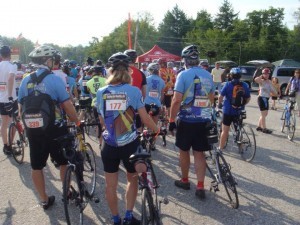
Ready to roll!
Yesterday I boarded one of several busses in Belfast and made the bumpy journey to Bethel, my trusty pink-accented black bike safely tucked into one of the many vans also making the trip. My husband and I, along with our daughter, Lexi, who’s riding for the first time, checked into our room and then met some friends for a few beers. (Below is a shot of us on a training ride back in Camden.)
This morning, we ate a little breakfast, pumped some air in our tires, and rode over to the start line, joining more than two thousand cyclists. We snapped on our helmets and took off, and now we’re winding our way along the Androscoggin River, through Rumford, Weld, and Wilton, headed toward our first night at the University of Maine Farmington.
My brother, William von Wenzel, myself and Ed at the finish line in 2010.
Despite the hordes of colorfully-shirted cyclists, we always see loads of familiar faces, such as friends we ride with on Saturday mornings; my daughter’s guidance counselor from Camden Hills Regional High School; our minister Kevin Pleas from the First Congregational in Camden; Jory Squibb, my birthday-sharing neighbor from my last post; Maria Libby, another neighbor and the assistant superintendent for our schools; and doctors and nurses from Pen Bay Medical Center. , We glimpse people we recognize from years past, such as the always ebullient Ed Miller, past Executive Director of the ALA in Maine. He still likes to give the assembled riders a little pep talk before releasing us in groups of thirty or so.
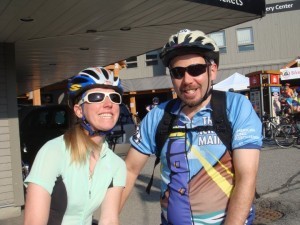
Robyn Chace and my brother, Will.
Day 2 of the Trek – Saturday — loops through New Vineyard, North Anson, and Norridgewalk, ending at Colby College in Waterville. In years past, Ed and I have pitched our tent on the grass in front of one of the college’s pretty buildings, but for a few years now we’ve gone deluxe and stayed in dorms. I joke with Ed that since we weren’t college coeds together, that this is our big chance to whoop it up. (“Whooping it up” will most likely mean taking Advil and falling asleep in twin beds.) Lexi’s in a dorm, too, although we won’t know where or with whom until we arrive.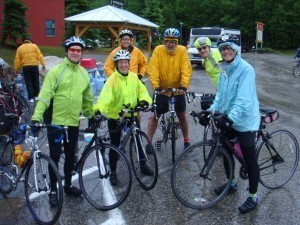
The year of the deluge… 2009.
The third day of the Trek takes us by China Lake, past Hussey’s General Store in Windsor, and then a long haul on Route 3, east into Belfast. Last year the route changed a bit because of highway work, and we all detoured off the main drag into Searsmont. Although there are several very big hills in that bucolic town, the ride is prettier and quieter, so Trek organizers incorporated the detour again this year.
Once we get to Belfast, there are throngs of people lining the streets, holding signs and ringing cowbells. There’s a celebratory cookout, scores of cheering volunteers with noisemakers, and the beautiful view of Penobscot Bay from Steamboat Landing. It’s also Father’s Day, so we don’t normally linger too long, but it’s awfully nice to grab a burger and celebrate the completion of another successful Trek.
So there you have it: roughly sixty miles each day, one-hundred and eighty miles in all, and thousands of dollars raised for healthy lungs and clean air. The ride is incredibly organized and manned by a fantastic team of volunteers from start to finish.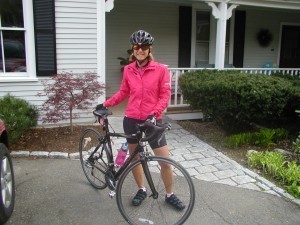
I love my Trek Women’s Specific Design Bike!
But what are the Trek Across Maine facts that no one ever talks about? Here’ my secret list.
1. They serve fluffernutters at the rest stops. Yes, along with the energy bars, sliced apples, granola and Goldfish are my favorite childhood sandwiches, and the reason I usually go home weighing three pounds more than when I started riding.
2. Even with sore muscles, dancing feels good. There are loads of opportunities to kick up one’s bike shoes during the Trek — at the rest stops (when you’re not eating a fluffernutter) at the bar in Farmington, on the common at Colby — and oddly enough, it feels great.
3. Everyone turns their bike shorts inside out. The first time I saw the airing-out technique of placing inverted lycra shorts on the top of a tent, I was disgusted, but see a few dozen gel pads, and pretty soon you’re doing it too. After all, who has time to handwash their shorts when there’s dancing to be done?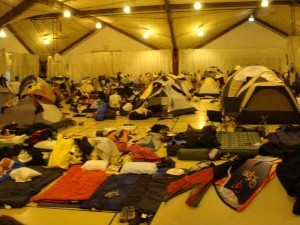
Camping in the fieldhouse because the tent sites were flooded!
4. It’s less fun when it rains.Remember June of 2009, when it poured non-stop here in Maine for twenty-plus days? Three of those were Trek days, and the first day in particular was nasty. Temperatures in the forties, buckets of rain pelting us as we pedaled, knee-high mud encircling both the fluffernutters and the port-a-potties — ugh. Although scores of riders bailed, Ed, myself, my brother, and other hardy (or crazy?) souls persevered. I won’t lie — it wasn’t a spin in the park. It was cold, wet, and miserable, which is why I’m overjoyed that this year’s forecast is on the sunny side.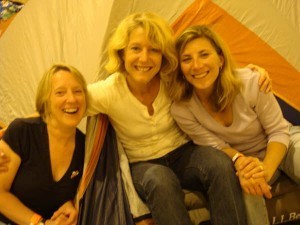
Sue Chace, me, and Amy Drinkwater in the gym
5. It’s not that hard to raise the money. After the registration fee of $55, each participant must obtain at least $500 in donations. It seems daunting (although compared to similar rides in other states, it’s a bargain) but once you ask a few people and cough up some funds yourself, you see that the fundraising isn’t going to be too arduous. After all, it’s a terrific cause — one that makes you breathe easy, even when you’re headed up a hill.
Check out my personal fundraising page you want to learn more. Next week I can start taking donations for 2015, because – God willing — I will be doing it again!
June 11, 2014
Even if your town’s made up, it has to be real
Please welcome today’s guest, Maureen Milliken, sharing a few thoughts about setting mystery novels in Maine.
At the Crime Bake conference in Dedham, Mass., last November I was standing in the agent pitch line with a fellow writer and the conversation turned to what our books were about. After telling her about mine, she remarked that her book, too, was set in Maine.
“Oh, do you live in Maine?” I asked.
No, she lived in New York.
“Are you originally from Maine?”
Turns out she visited a quaint coastal town for a very short time several years back and loved it.
I asked if she was going to make some extended visits to do research for her setting. She seemed confused.
“I don’t have anything planned, but I do hope to get back there to visit one day.”
I asked if she was concerned about getting the setting right. She seemed surprised.
“No, I’m using guidebooks and the Internet.”
A totally different discussion about setting came up at another writers’ conference I attended in April.
At the Friday night bar schmooze at the Maine Writers and Publisher’s Alliance Crime Wave, a lively discussion broke out over whether having a mystery set in a fake town was better than in a real town. Let’s just say we agreed to disagree.
Writing is a grand and glorious thing, and one of the best things about it is that there’s no right way or wrong way, just the writer’s way. That said, writers focused on the craft agree that setting is one of the major characters in a book. A book whose author doesn’t know the characters well tends to not hit all the marks. That is true for setting as well. I couldn’t help think the book my line friend at Crime Bake was pitching probably wasn’t all it could be.
While guidebooks and the Internet have their uses, if you live here, you know why that won’t work to create a setting. I can’t imagine the guide book, for instance, that would tell you how Route 27 looks after an ice storm right when the sun is beginning to come up the next morning.
Or what the docks at the local marina look like in November.
Or that many of the state’s residents bring their garbage to a dump instead of having it picked up. And what the hopper at that dump is like, especially the weekend after Christmas.And the knock-you-for-a-loop-every-time-you-see-it view you get when you drive to the dump.
It’s a good bet none of those things are important enough for a plot to turn on – okay maybe the dump hopper and I’m already doing something on that, so stay away from it, okay? But if a writer doesn’t understand the million tiny things that make a setting special, it’ll show.
I am firmly in the camp of making up towns, but with a serious nod to a real area. The idea is that a reader can almost feel it, think maybe he or she drove through it last time in the area. It’s real on the page.
I’ll admit that before I started writing, I used to be bugged by made-up towns. I’d pore over maps trying to figure out where they were, what they were supposed to be.
Living in Maine, many of us who read Stephen King couldn’t help but wonder about his, because they seemed so much like places we know. In fact, in a recent discussion at work, one coworker asked another, new to the state and a King fan, “Been to Derry yet?”
The Wikipedia entry about Derry – used here only for our entertainment purposes not actual research! – says it’s “said to be near Bangor, Maine, but King has acknowledged that Derry is actually his portrayal of Bangor. A map on King’s official website, though, places Derry in the vicinity of the town of Etna.” Which is near Bangor.
Confusing? Yes. Also spot-on.
Once I started writing fiction and got over my journalist’s panic at making things up, the fake town thing made sense. I could put things where I wanted, invent businesses and organizations, move geography around to make it work with my plot.
And I realized that inventing a town or area is a lot like inventing characters – writers may use attributes, elements, even feelings, picked up along the way, but a town isn’t really a replica of a real town full of fake stuff. Not even necessarily inspired by a real town. Like our characters, it’s a bunch of stuff mixed together that’s sprung up in our head and unique in its own way.
Where’s my town? Somewhere near Kingfield and Phillips in Franklin County. Even looks kind of like them. Routes 27 and 16 are nearby. The exact location? Well, just kind of up there. Somewhere. As Wikipedia might say, it’s said to be near Kingfield, Maine.
But if you’re going to make it up, you still have to get it right.
In fact, once I moved back to Maine three years ago after almost 30 years away, this became glaringly obvious to me. So obvious, I had to move my town to make it more real. I wrote about this brilliant decision for Maine Crime Writers in January 2013.
I admit it. Even though I grew up here, I was faking it a little on setting before I got back. Not on purpose. I just forgot about stuff like the dump, and ridge roads and a lot of other little things that you only know if you’re here.
There were those at that Crime Wave Friday night booze schmooze who insisted a real town or city is the way to go. They pointed out you can even put fake things in it. The readers who know there’s not a Burger King on that corner will (hopefully) be far outweighed by those from away who have no clue.
As I said, there’s no right answer. But readers no matter where they’re from will see the falseness if it’s not the real thing – fake town or actual one.
As Bob Dylan wrote, “Know your song well before you start singing.”
While there was lively disagreement that Friday night, when it comes down to the real town versus fake town debate, we’re really on the same page, because good fake towns are as real as we can get them.
Maureen Milliken is news editor for the Kennebec Journal in Augusta and Morning Sentinel in Waterville. She writes a twice-monthly column that is published in both newspapers. Her mystery novel, Cold Hard News, in future-publish mode, is set in Franklin County, as are the prequel and sequel she is working on. She lives in Belgrade Lakes.
June 10, 2014
Don’t Come to Bailey Island . . .unless you have time to savor it

Bailey Island sunset
Kate Flora here, following on Sarah’s footsteps. Sometimes it seems all Maine crime writers are starting to think alike. The snow has finally melted. The gardens are slowly coming to life. Very slowly this year, it seems. And now we are bracing for the summer onslaught.
Of course I don’t really mean that you shouldn’t come to Bailey Island. Bailey Island is gorgeous.

The Cribstone Bridge
Scenic. Truly Maine. I want you come and enjoy it. And when you do, making the long drive down from Cook’s Corner on Route 24, or coming down 123 and across on The Mountain Road (where there is no mountain), you will twist and wiggle your way down the end of Orr’s Island and come creeping across the Cribstone Bridge. Take your time driving down. Unlike so many places along the coast, on Route 24 you get one great vista after another, so slow down and savor them–the rocky fir-lined coast, the stunning blue or mysterious deep green of the water, the chugging lobster boats.
 Before you even cross the bridge, you might want to make a stop. Spend half a day at H2Outfitters http://www.h2outfitters.com, renting a kayak and paddling around the island. Stop for chowder or pie or a lobster roll. Then cross the bridge.
Before you even cross the bridge, you might want to make a stop. Spend half a day at H2Outfitters http://www.h2outfitters.com, renting a kayak and paddling around the island. Stop for chowder or pie or a lobster roll. Then cross the bridge.
If you only have an afternoon, you may want to head for Land’s End, where there is a wonderful statue honoring Maine’s lobstermen and a beach for skipping stones, and a crazy gift shop full of scented candles and lobster shaped hats and everything you can imagine with blueberries on it. On the way, stop at the head of Mackerel Cove and look out to sea, past the thicket of lobster boats. There’s a beach there if you’re in the mood for sunbathing, and a parking lot and picnic area and sometimes you can find good beach glass there.
honoring Maine’s lobstermen and a beach for skipping stones, and a crazy gift shop full of scented candles and lobster shaped hats and everything you can imagine with blueberries on it. On the way, stop at the head of Mackerel Cove and look out to sea, past the thicket of lobster boats. There’s a beach there if you’re in the mood for sunbathing, and a parking lot and picnic area and sometimes you can find good beach glass there.
On your way back, stop at Tiffin’s Ice Cream http://baileyislandtiffins.com.

A Tiffin’s cone
Then, on your way back up the island, turn right onto Washington Avenue. Park at the tiny church (unless it’s a Sunday), and take the path along the rocks to the Giant’s Stairs. Be sure to watch out for poison ivy as you walk, but once again, take your time. Watch the waves splash on the rocks, peer into tide pools, watch the ducks swimming, and count how many boats you can see. You might find blueberries or blackberries. Or smell the sweetness of beach roses. Bring you camera, bring your book, or just sit on the rocks, listen to the surf, the chug of boat engines and the wheeling gulls overhead, and watch the clouds blow by.
If you have more time, you’ll want to have a cocktail at 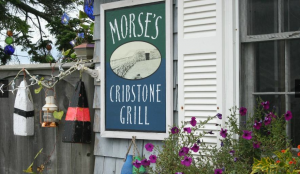 Morse’s Cribstone Grill, which has wonderful views over the rocks and up the coast. Grilled swordfish appetizers? A salad with tons of lobster? How about lobster quesadillas or a fish sandwich as you watch the slanting rays of the setting sun change the landscape.
Morse’s Cribstone Grill, which has wonderful views over the rocks and up the coast. Grilled swordfish appetizers? A salad with tons of lobster? How about lobster quesadillas or a fish sandwich as you watch the slanting rays of the setting sun change the landscape.
More time still? Spend the night at one of the local motels and then treat yourself to blueberry pancakes at the Giant Stairs Seafood Grille. Or go later for a lobster roll, sweet potato fries and an irresistible slice of homemade pie. My favorite is raspberry.
Maybe what you really want to do is go out on the water? Yes? Then take the Casco Bay Ferry for the bay cruise that leaves from Cook’s Lobster House.
Then, back across the bridge on Orr’s, stop at The Nest and browse their interesting selection of antiques and odd bits, then a trip to the candy store before you slowly wind your way back up the chain of islands, vowing next time, you’ll leave yourself more time. Eat more lobster. Have that slice of pie. Go on some of the new hiking trails. Screw up your courage and go for a swim in the sea.
Lea Wait's Blog
- Lea Wait's profile
- 509 followers




